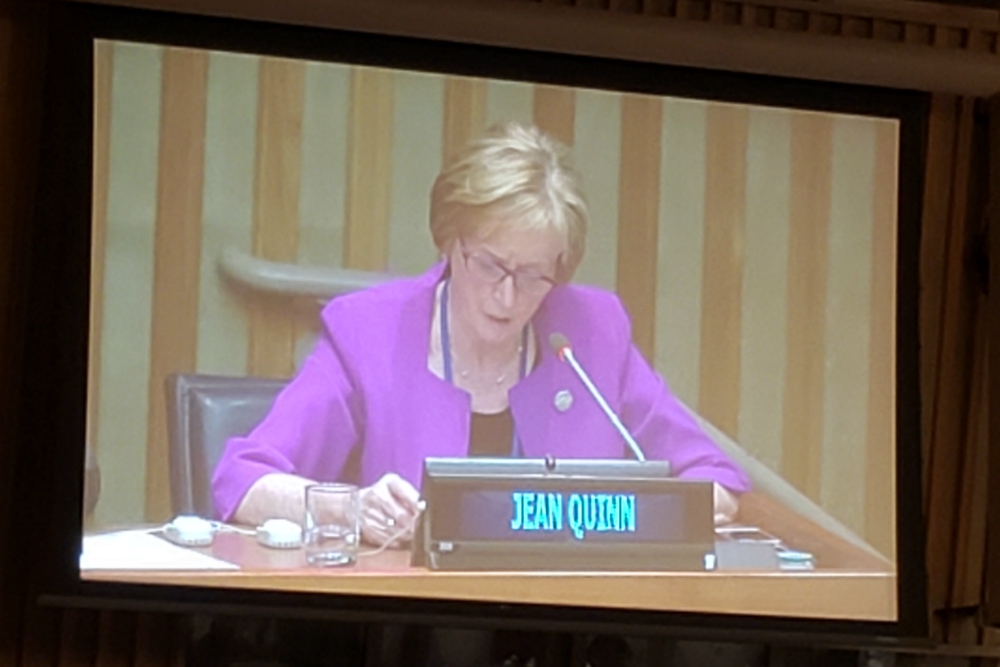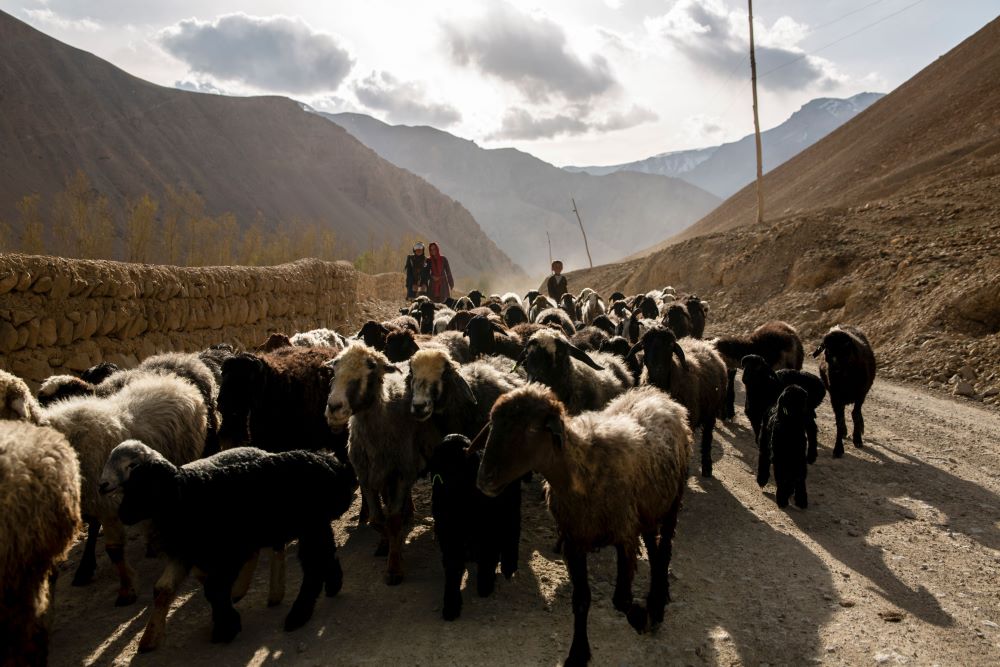Pope Francis greets nuns during his general audience in the Paul VI hall at the Vatican Jan. 5. Francis has said women religious play an essential role in the synodal process through their prayers and participation and by listening to people not usually part of such church activities. (CNS photo/Paul Haring)
Editor's note: Global Sisters Report's Monday Starter is a weekly feature from GSR staff writers that rounds up news from or about women religious that you may otherwise have missed.
It is no secret that the synod on synodality is coming up, and that as part of the synod process, Pope Francis is asking every member of the church to examine their roles and what the Holy Spirit is calling them to do.
But what does that mean, really?

The Center for the Study of Consecrated Life at Catholic Theological Union in Chicago hopes to answer that question at a virtual seminar at 7 p.m. CST on Jan. 12. Specifically, the seminar will examine how consecrated religious are called to participate in the process, what they are invited to offer to the synod and what they may receive.
The seminar is free, but registration is required.
The seminar will be led by Sacred Heart Sr. Maria Cimperman and Boston College School of Theology and Ministry professor Rafael Luciano. Cimperman is director of the Center for the Study of Consecrated Life and author of Religious Life for Our World: Creating Communities of Hope. She was named by the International Union of Superiors General to a four-person commission that created a synodal process for congregations and who will encounter the responses from religious congregations and offer a synthesis for the synod.
Luciano is an expert on the Theological Commission of the General Secretariat of the Synod of Bishops and on the faculty at the Universidad Católica Andrés Bello in Caracas, and is a member of the Theological Advisory Team of the Presidency of CLAR (Latin American Confederation of Religious).

Daughter of Wisdom Sr. Jean Quinn speaks Feb. 10, 2020, at an opening session of the United Nations' Commission on Social Development meeting on homelessness. (GSR photo/Chris Herlinger)
Advocates hail UN resolution on homelessness
Advocates for people who are homeless are hailing a resolution on homelessness by the United Nations General Assembly, the U.N.'s main deliberative body.
The resolution approved Dec. 16 urges U.N.-member states to eliminate all forms of discrimination against those experiencing homelessness and to decriminalize homelessness. It also notes the need to recognize the context of homelessness in the ongoing global pandemic.
The approval came after the U.N's Third Committee — a group that approves preliminary resolutions before they go to the General Assembly — approved the measure Nov. 19.
The resolution strengthens efforts to raise the visibility of the problem of homelessness globally, said Daughter of Wisdom Sr. Jean Quinn.
Advertisement
"This new resolution is a monumental step in the right direction highlighting homelessness with all 193 member states," said Quinn, who heads the U.N.-based advocacy coalition UNANIMA International and co-chairs the Working Group to End Homelessness, which brings together sister congregations and other U.N. groups concerned about the problem.
"We spent the past year working on the document, helping member states to recognize that homelessness has many forms including ones that are not commonly thought of as 'homeless,' including doubling up, living in situations of abuse, whether physical or emotional, living in inadequate housing," Quinn told GSR in an email.
"These forms of homelessness are present in the Global North and Global South alike and are traumatizing; they affect women children and girls significantly."
UNANIMA and the Working Group to End Homelessness have been increasingly visible on the issue at the United Nations, which had historically not focused much attention on the issue. But that has changed, particularly after a series of landmark meetings in 2020 at the United Nations in New York focused attention on the problem. (GSR covered those meetings as part of "A Place to Call Home," an award-winning series about sisters who aid those who are homeless or lack adequate shelter.)
"Homelessness is a global concern and must be addressed at the highest level of the General Assembly," said Mohamed Siad Doualeh, Permanent Representative of Djibouti to the United Nations, who co-chaired the Third Committee's 76th session in 2021, and quoted by the homelessness working group.
The resolution, the group notes, calls on U.N-member states "to address the structural drivers of homelessness. These drivers include inequalities, poverty, a loss of housing and livelihood as well as limited access to decent job opportunities, affordable housing, social protection, land, and affordable energy and health care."
The National Shrine of St. Elizabeth Ann Seton in Emmitsburg, Maryland (CNS/Courtesy of the National Shrine of St. Elizabeth Ann Seton)
Initiative to expand awareness of St. Elizabeth Ann Seton
The National Shrine of St. Elizabeth Ann Seton in Emmitsburg, Maryland, is launching a series of initiatives to expand awareness of first U.S.-born saint, it announced Jan. 4, the saint's feast day, Catholic News Service reported.
The initiatives build on the momentum of a yearlong commemoration of the 200th anniversary of the saint's death.
"Underlying all that we do at the shrine is the strong belief that Mother Seton does not belong to the past. She belongs to all of us today and all those in the future who seek greater meaning in their lives and a friend in heaven," said Rob Judge, executive director of the shrine.
The initiatives for 2022 include a series of essays, continued retreats and an added at-home retreat, an emailed prayer program and the renovation of the shrine's museum and visitors center.
The shrine will publish on its website a biweekly series of spiritual essays profiling Catholic artists, novelists, poets and visionaries, from the perspective of St. Elizabeth Seton's life and spirituality.
Information about the initiatives can be found at www.setonshrine.org.

The Bamyan Dar-e-Chast district in Afghanistan, is home to 160 people, a majority of whom depend on farming to survive. Catholic Relief Services says that the threat of hunger continues in Afghanistan, where it has worked responding to humanitarian needs. (CRS/Stefanie Glinski)
CRS highlights 'top humanitarian crises' for 2022
Catholic Relief Services, the Baltimore-based humanitarian organization, says eight humanitarian crises globally deserve monitoring and attention in 2022.
At the top of CRS's list are growing crises related to hunger in Afghanistan and Ethiopia.
"As COVID-19 spreads, so do the shadow pandemics of hunger and malnutrition. Many other crises, whether they're driven by COVID-19, climate change, political upheaval or protracted conflict, require our immediate attention," Caroline Brennan, CRS' communications director for emergency response, said in a Dec. 27 statement.
A record 274 million people needed some kind of humanitarian support in 2021, according to a recent United Nations report. That is a 17% increase from the previous year, said CRS, the official international aid agency of the U.S. Catholic Church.
Globally, more funding and attention are needed for "urgent crises," Brennan said.
CRS' list focuses on eight humanitarian crises that CRS staff believe could worsen in 2022, prompting more poverty and hunger.
The situations in Afghanistan and Ethiopia are due to, respectively, Afghanistan's slide "into economic freefall" after the August takeover of the country by the Taliban, and millions affected by the conflict in the Amhara, Afar and Tigray regions of Ethiopia, CRS said.
Other hunger-related crises cited by CRS include ongoing drought in southern Madagascar; the five-year war between Houthi rebels and government forces in Yemen; worsening poverty in Venezuela; and endemic poverty and the threat of gang violence in the Central American nations of El Salvador, Guatemala and Honduras.
Also on the list: ongoing economic and political unrest in Haiti, made worse by an August 2021 earthquake; and violence in Africa's Central Sahel region, where more than 2 million people have been uprooted and displaced.
Catholic News Service and GSR National Correspondent Dan Stockman contributed to this report.







